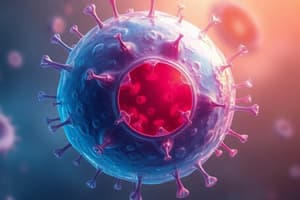Podcast
Questions and Answers
What is hypertrophy?
What is hypertrophy?
An increase in the size of the cells.
What leads to hypertrophy in muscle cells?
What leads to hypertrophy in muscle cells?
Increased demand on cells.
Which of the following is an example of physiological hypertrophy?
Which of the following is an example of physiological hypertrophy?
- Liver regeneration after resection
- Skeletal muscles responding to exercise (correct)
- Hypertrophy in heart failure
- Endometrial hyperplasia due to excess estrogen
What is hyperplasia?
What is hyperplasia?
Which type of hyperplasia occurs during pregnancy?
Which type of hyperplasia occurs during pregnancy?
Pathologic hyperplasia can increase the risk of cancer.
Pathologic hyperplasia can increase the risk of cancer.
What are the two types of physiological hyperplasia?
What are the two types of physiological hyperplasia?
What happens when the adaptive capability of cells is exceeded?
What happens when the adaptive capability of cells is exceeded?
What causes hypoxic cell injury?
What causes hypoxic cell injury?
What is the difference between necrosis and apoptosis?
What is the difference between necrosis and apoptosis?
Flashcards are hidden until you start studying
Study Notes
Adaptation to Environmental Stress
- Cells constantly adapt to changing demands within physiological limits
- Adaptation is the structural and functional response of cells to stress
- Primary adaptive responses include hypertrophy, hyperplasia, atrophy, and metaplasia
- Excess stress can lead to cell injury, potentially reversible at first, but severe or persistent stress causes irreversible injury and cell death
Hypertrophy
- Increase in cell size, leading to increased tissue/organ size
- Occurs in non-dividing cells, like striated muscle
- Can be physiological or pathological
- Physiological hypertrophy includes:
- Breast during lactation
- Pregnant uterus
- Skeletal muscle hypertrophy due to exercise demand
- Pathological hypertrophy includes:
- Cardiomyocyte hypertrophy in heart failure due to conditions like hypertension or aortic valve disease
Hyperplasia
- Increase in cell number, potentially leading to increased tissue/organ size
- Occurs in cells capable of replication
- Can be physiological or pathological
- Physiological hyperplasia:
- Hormonal hyperplasia: e.g., breast gland proliferation at puberty and pregnancy
- Compensatory hyperplasia: e.g., liver regeneration after partial resection
- Pathological hyperplasia:
- Caused by abnormal excessive stimulation, often by hormones or growth factors
- Example: Endometrial hyperplasia due to excess estrogen leading to abnormal menstrual bleeding
- Can be a pre-cancerous condition
Hypertrophy and Hyperplasia
- Can occur together, as seen in the uterus during pregnancy, where smooth muscle hypertrophy and hyperplasia take place
- Benign prostatic hyperplasia (BPH) is an example of hyperplasia in response to hormonal stimulation
Studying That Suits You
Use AI to generate personalized quizzes and flashcards to suit your learning preferences.




